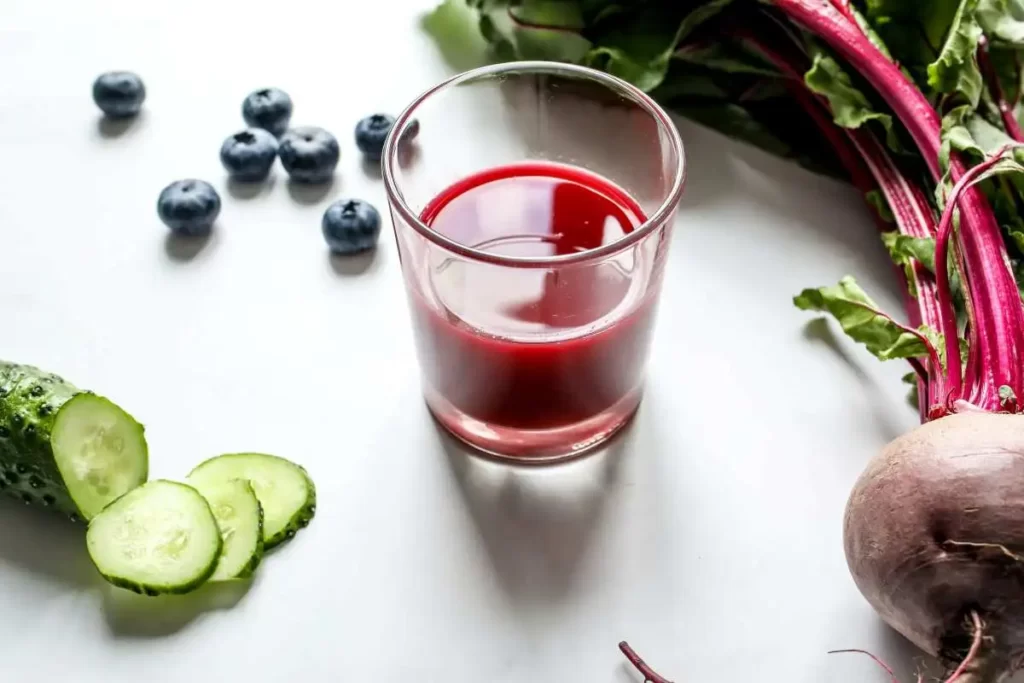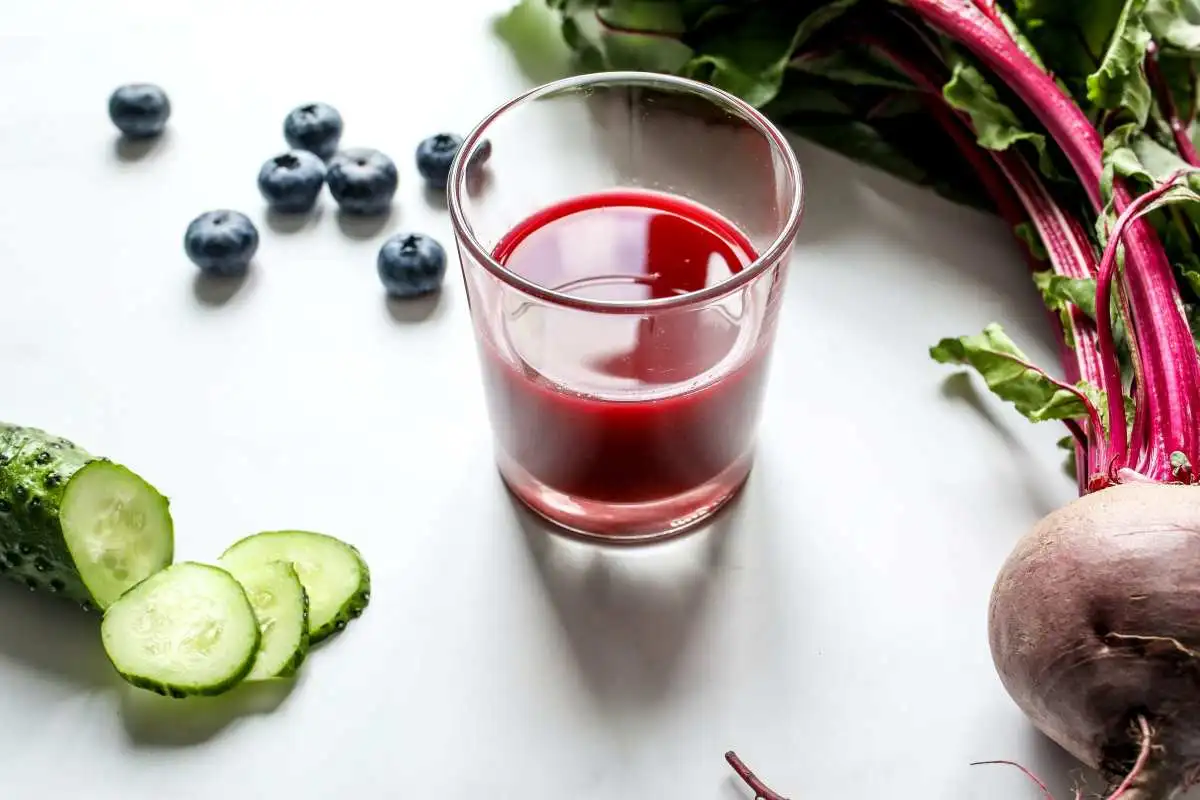In the realm of nutrition and wellness, beet juice has garnered significant attention for its purported health benefits and vibrant hue.
Packed with essential nutrients and antioxidants, beet juice has become a staple in the diets of health-conscious individuals.
But amid all the talk of its nutritional prowess, one question often arises: What does beet juice taste like?
Let’s embark on a flavorful exploration to unravel the taste profile of beet juice, examining its unique characteristics, flavor nuances, culinary uses, and more.

Table of Contents
The Allure of Beet Juice
Beet juice, derived from the humble beetroot (Beta vulgaris), offers a spectrum of health benefits.
This deep crimson elixir is a rich source of vitamins, minerals, and potent antioxidants, making it a darling in the world of superfoods.
From enhancing cardiovascular health and improving exercise endurance to aiding in detoxification and supporting cognitive function, the benefits of beet juice are vast and diverse.
However, despite its remarkable health advantages, the taste of beet juice can be a decisive factor for many individuals considering incorporating it into their diet.
Read: What Does Turnip Taste Like? Benefits, Side Effects & More.
What Does Beet Juice Taste Like?
Describing the taste of beet juice is a multifaceted endeavor, as it encompasses a myriad of sensory experiences.
Here are some common descriptors that attempt to capture the essence of beet juice’s taste:
Earthy Undertones:
Beet juice carries an unmistakably earthy quality that stems from its natural composition.
The earthiness is akin to the flavor of fresh soil, providing a grounding and rustic essence that is characteristic of root vegetables.
Sweetness:
Surprisingly, beet juice offers a subtle sweetness that pleasantly balances its earthy notes.
The sweetness, reminiscent of sugar beets, can vary depending on factors like the beet’s variety, ripeness, and processing method.
Slight Tanginess:
Some individuals detect a mild tanginess or acidity in beet juice.
This tangy undertone contributes to the complexity of its flavor profile, adding a refreshing zing that complements its earthy sweetness.
Robustness:
Beet juice boasts a robust flavor that is both bold and distinct. Its richness can be compared to other hearty vegetables, lending depth to culinary creations and beverages.
Vegetable Essence:
As a product of the beetroot, the juice encapsulates the essence of vegetables.
This vegetal quality might evoke associations with other root vegetables, contributing to its wholesome and natural appeal.
Read: What Does Barbados Cherry Taste Like?
Exploring the Culinary Versatility of Beet Juice
Beyond its taste profile, beet juice’s versatility in culinary applications adds to its appeal. Here are some exciting ways to incorporate beet juice into various dishes:
Beverage Blends:
Blend beet juice with other fruits or vegetables like apples, carrots, ginger, or citrus fruits to create refreshing and nutritious beverages.
Experiment with different combinations to tailor flavors to your liking.
Salad Dressings:
Use beet juice as a base for salad dressings, adding depth and a vibrant hue to your salads.
Combine it with ingredients like balsamic vinegar, olive oil, honey, or herbs for a delightful dressing.
Soups and Stews:
Introduce beet juice into soups or stews to infuse them with a subtle sweetness and depth of flavor.
It can complement the savory elements of these dishes while contributing its unique earthy notes.
Baking:
Utilize beet juice as a natural food coloring agent in baking. Its intense hue can transform cakes, muffins, and other baked goods, imparting a beautiful reddish-purple tint.
Read: Benefits Of Fruit Juice In The Morning (With Recipe).
How to Make Beetroot Juice (Beet Juice)
Making beetroot juice is relatively simple. Here’s a basic recipe:
Ingredients:
- 2-3 medium-sized beets (washed and peeled)
- Water (as needed for consistency)
- Optional: Fruits or vegetables for flavor enhancement
Instructions:
- Chop the beets into smaller pieces for easier blending.
- Place the chopped beets into a blender or juicer.
- Add a small amount of water (if using a blender) and blend until smooth. Adjust the water quantity for desired consistency.
- Strain the mixture through a fine mesh sieve or cheesecloth to remove pulp if preferred.
- Enjoy the fresh beet juice as is or mix it with other ingredients for added flavor.
Read: 15 Benefits of Drinking Fresh Juice Daily.
What Can I Mix With Beet Juice to Make It Taste Better?
To enhance the taste of beet juice, consider mixing it with other fruits or vegetables that complement its flavor.
Popular additions include apples, carrots, ginger, citrus fruits like oranges or lemons, and even pineapple.
These ingredients can add sweetness, tanginess, or a refreshing zing, balancing the earthy notes of beet juice and making it more palatable.
Read: The Best Time to Drink Vegetable Juice.
Benefits of Beet Juice:
1. Improved Exercise Performance:
Beet juice contains nitrates, which can enhance athletic performance by increasing nitric oxide levels in the body.
This compound may improve oxygen utilization, leading to increased endurance and potentially better exercise efficiency.
2. Potential Blood Pressure Reduction:
The high nitrate content in beet juice has been associated with a potential reduction in blood pressure.
Nitric oxide helps dilate blood vessels, aiding in better blood flow and potentially contributing to lower blood pressure levels.
3. Enhanced Heart Health:
The antioxidants, particularly betalains, found in beet juice have been linked to improved cardiovascular health.
They help reduce inflammation, support healthy blood vessel function, and may decrease the risk of heart disease.
4. Detoxification and Liver Support:
Betalains in beets aid in detoxification processes by supporting liver function and facilitating the elimination of toxins from the body.
This can contribute to overall detoxification and improved liver health.
5. Rich in Nutrients:
Beet juice is a powerhouse of essential nutrients, including vitamins like vitamin C and B vitamins (folate, B6), minerals such as potassium, manganese, and iron, as well as dietary fiber.
These nutrients play vital roles in various bodily functions, supporting overall health and well-being.
Read: 5 Benefits of Drinking Vegetable Juice in the Morning.
Does Beet Juice Lower Blood Pressure?
Studies suggest that beet juice may help lower blood pressure due to its high nitrate content.
Nitrates are converted into nitric oxide in the body, which helps relax and dilate blood vessels, leading to improved blood flow and potentially reduced blood pressure levels.
However, individual responses may vary, and it’s advisable to consult a healthcare professional before using beet juice as a sole means of managing blood pressure.
Side Effects of Beet Juice:
1. Staining of Urine and Stool:
Beets contain pigments that can cause urine and stool to appear reddish or pinkish after consumption.
While harmless, this discoloration might cause alarm initially, but it typically resolves on its own without any health concerns.
2. Potential for Kidney Stones:
Beets are high in oxalates, compounds that may contribute to the formation of kidney stones in susceptible individuals.
Those prone to kidney stones might consider moderating their beet consumption or consulting a healthcare professional.
3. Interaction with Medications:
People taking medications for blood pressure or erectile dysfunction (e.g., drugs like sildenafil) should be cautious with beet juice due to its potential to lower blood pressure.
It’s advisable to consult a healthcare provider to avoid any adverse interactions.
4. Gastrointestinal Discomfort:
Some individuals might experience digestive issues such as bloating, gas, or an upset stomach after consuming beet juice, especially if they have a sensitive digestive system.
Starting with smaller quantities and gradually increasing intake can help mitigate this effect.
5. Allergic Reactions:
Allergies to beets are uncommon but possible. Individuals with known allergies to beets or other related vegetables (e.g., spinach) should be cautious and monitor for any allergic reactions after consuming beet juice.
Conclusion
So, what does beet juice taste like? The taste of beet juice is a harmonious interplay of earthiness, subtle sweetness, tanginess, and robustness.
Its versatile nature allows for diverse culinary applications, inviting exploration and creativity in the kitchen.
While the earthy undertones might not immediately appeal to everyone’s palate, the addition of other ingredients or blending techniques can help mellow or complement its distinct flavor, making it an enjoyable and nutritious addition to your diet.
So, whether sipping a revitalizing beet juice blend or incorporating it creatively into recipes, embracing the unique taste of beet juice can lead to a journey of culinary discovery and wellness.
Remember, taste preferences vary, and experimenting with different combinations and recipes can help tailor the experience of beet juice to suit individual palates.
Cheers to embracing the vibrant taste and myriad benefits of beet juice!
FAQs:
Beet juice in the morning can provide a unique flavor experience.
The taste might be more pronounced due to a heightened sensitivity of taste buds early in the day.
Expect a refreshing, earthy, and slightly sweet flavor profile that can be invigorating and awakening to the senses.
Beet juice offers an array of health benefits owing to its rich nutritional content. Some benefits include:
– Improved Exercise Performance: The nitrates in beet juice may enhance athletic performance and endurance by improving oxygen utilization in the body.
– Lower Blood Pressure: Consumption of beet juice has been linked to potential reductions in blood pressure due to its nitrate content, which helps dilate blood vessels.
– Enhanced Heart Health: The antioxidants and nutrients in beet juice may promote cardiovascular health by reducing inflammation and supporting healthy blood flow.
– Detoxification: The betalains in beets aid in detoxifying the body by supporting liver function and promoting the elimination of toxins.
Beets have an earthy, slightly sweet taste with a hint of bitterness.
The flavor can vary based on the beet variety and preparation method.
When consumed as juice, the taste of beets is often described as earthy, mildly sweet, and somewhat reminiscent of freshly dug soil.
The recommended beet juice intake can vary depending on individual health conditions and tolerance levels.
However, a commonly suggested amount is around 8 to 16 ounces (240 to 480 ml) per day to reap its potential health benefits.
It’s essential to start with smaller amounts and monitor how your body responds before increasing the intake.

